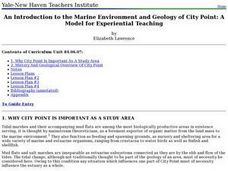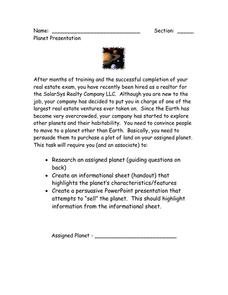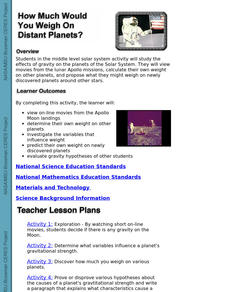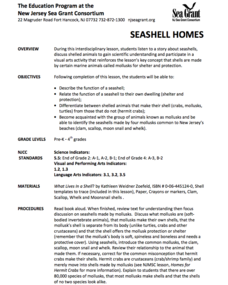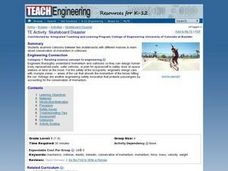Curated OER
An Introduction to the Marine Environment and Geology of City Point: A Model for Experiential Teaching
Young scholars begin the lesson by researching the history of City Point, Connecticut. Using a map, they color areas they were asked to find and discuss why the areas are important to the community. As a class, they are shown recent...
Curated OER
Poetry and Nature
Students observe an object in nature and record them. In groups, they create a group poem about the same object. They create their own poem based on another object using other their senses to help them. They share their poems with the...
American Museum of Natural History
What do You Know About Marine Biology
Show me what you know about the sea. Learners answer 10 questions about marine biology. The questions range from what evidence points to the origin of life to the biggest threat to oceans.
NASA
Packing for a L-o-o-o-ng Trip to Mars
Pack just enough to fit. Crews determine what personal items to take with them on a trip to Mars. Each team must decide what to take with them on a two-and-a-half year trip to Mars and whether their items will fit within the allotted...
Curated OER
Gravity Versus The Mighty Egg - Biology Teaching Thesis
Students are able to describe the principles of gravity. They name other places in the real world where we compensate for gravity. Students design a shock absorber with limited materials and explain how it works to protect an egg. They...
Curated OER
Oceanography Worksheet #1
If you are teaching physical oceanography to middle school earth scientists, here is a terrific multiple choice worksheet. Learners look at a diagram of a landscape created by glacial sediment deposition and the resulting ocean floor....
American Museum of Natural History
What is Marine Biology?
A marine environment covers the majority of the earth but is arguably the least understood. Teach young scientists about the characteristics of oceans and ocean species using an interactive online lesson. The in-person or remote learning...
Curated OER
What is Momentum?
In this momentum worksheet, students will calculate the maximum forward momentum of the Apollo 11 lunar spacecraft at three different stages of its space travel.
Curated OER
Aquatic Ecosystems
Students study the diversity of marine life and their habitats. In this aquatic ecosystems lesson students complete a lab activity and experiment.
Curated OER
The Impact
Students study inventions and how they have impacted us. In this investigative lesson students study the history of two inventors then pretend that they are an inventor.
Curated OER
Exploring the Hudson in 1609
Learners follow the journey of Henry Hudson down the river with his name. Using journal entries and maps, they learn about its exploration. They use maps to identify stages of the journey, and practice converting distances into miles.
Curated OER
Location
Students explore the tools used by Columbus to chart his latitude. They study the change of a location over time.
Mr. Jones's Science Class
Planet Presentation
Upper-elementary astronomers take on the role of interplanetary real estate salesmen. They research an assigned planet and create a PowerPoint to persuade the rest of the class to purchase property and move there. This fun project would...
Curated OER
Earth/Globe (poles & equator)
First graders create his/her own paper mache earth and label the poles and equator. The land masses can be added and labeling of specific bodies of water. The paper mache earth can then be used to discuss the sun, moon, and the earth and...
Curated OER
Artificial Satellites and Space Probes
In this satellites instructional activity, students match the list of facts given with the artificial satellite or space probe that it describes. This instructional activity has 12 matching questions.
Curated OER
My Spacecraft and Cassini
Pupils discover solutions to the problems that NASA used in a previous lesson. They write a paper comparing and contrasting their spacecraft idea to the one that was actually used to go to Saturn. They also discover Saturn's moons.
Curated OER
Yearly Place Based theme
Students are awaken to their surroundings. They gain a greater access of how their city was formed. Students assess the human impact on the land. They comprehend the cultural diversity of the city.
Curated OER
How Much Would You Weigh On Distant Planets?
Students study the effects of gravity on the planets of the Solar System. They view movies from the lunar Apollo missions, calculate their own weight on other planets, and propose what they might weigh on newly discovered planets around...
K5 Learning
Why Does the Ocean have Waves?
Six short answer questions challenge scholars to show what they know after reading an informational text that examines waves—what they are, what causes them, and how different Earth factors affect their size and strength.
Curated OER
Galaxies and the Universe
If Earth was formed 4600 million years ago, and the sun revolves about the center of the Milky Way once every 250 million years, how many revolutions have occurred? Students answer this question and ten more, all providing students with...
Curated OER
Seashell Homes
Pupils listen to a story about seashells. They discuss shelled animals. Learners describe the function of seashell. Pupils relate the function of a seashell to their own dwelling. They differentiate between shelled animals that make...
Curated OER
Skateboard Disaster
Learners conduct a hands-on experiment with collisions between two skateboards of different masses. They are introduced to the concept of conservation of momentum in collisions and consider how their observations might help engineers...
Curated OER
Microbial Influence on Earth's Systems
Students identify the different biogeochemical cycles on Earth. In this biology instructional activity, students observe microbes under a microscope. They compare and contrast respiration and photosynthesis.
Curated OER
Outside Animals Crossword Puzzle
In this outside animals activity, learners explore all the possible animals that live outside in the wilderness and their habitats and then find the answers to fifty questions associated with those animals in a crossword puzzle.
